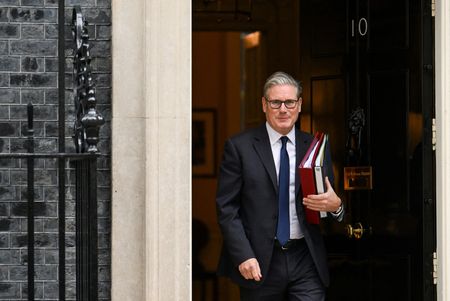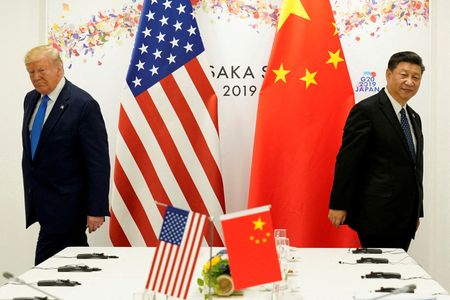By Michael Holden
LONDON (Reuters) -The British government has come under sustained criticism after a prosecution against two men accused of spying for China collapsed last month, with critics saying it was because of fears of upsetting Beijing.
Here is what the case is about and why it has proved controversial:
WHAT IS THE UK CHINESE SPYING CASE?
Two men, Christopher Cash, 30, a former director of the China Research Group think-tank, and Christopher Berry, 33, who worked as a researcher for a senior lawmaker, were arrested by British police in March 2023 on suspicion of spying for China.
In April 2024, the men were charged with an offence under the 1911 Official Secrets Act of passing politically sensitive information to a Chinese intelligence agent known as “Alex”. They denied any wrongdoing and China says the case is entirely fabricated and a malicious slander.
In an unexpected move, Britain’s Crown Prosecution Service (CPS) dropped the charges on September 15, a month before the trial was due to start, saying the case no longer met the evidential threshold.
WHY DID THE CHINESE SPYING CASE COLLAPSE?
Since it was dropped, Prime Minister Keir Starmer’s Labour government has been accused by opponents of undermining the prosecution because it did not want to upset China, with which it is seeking better economic ties.
Critics have particularly singled out Britain’s National Security Adviser Jonathan Powell because of what they say are his ties to China.
The UK government has rejected these accusations. Starmer said the decision to drop the case was made independently by the CPS and that ministers were disappointed it had not gone ahead.
However, the CPS said, prior to the prosecution being dropped, that it had for many months asked the government for new evidence which it believed was necessary for the case to go ahead.
WHY IS THERE A DISPUTE?
The problem centred around the wording of the charge. Under the Official Secrets Act (OSA), a law brought in to deal with German spying before World War One, it is an offence to communicate documents which might be useful to “an enemy”.
At the time when the men were charged, Britain’s then-Conservative government had classified China as an “epoch-defining challenge” but stopped short of officially labelling it a threat.
However, lawmakers and the intelligence agencies had regularly warned about the threat of Chinese espionage and activities designed to influence British politicians, businesses and academia.
In July 2024, in a separate case which involved a team of Bulgarians later found guilty of spying for Russia, London’s Court of Appeal determined that an enemy under the OSA meant a country which “represents a current threat to the national security of the UK”.
It was following that ruling that the CPS said it had sought new evidence from the government, but that none of the additional witness statements obtained stated that China was a threat to national security at the time of the offence.
The government says the statements, provided by a deputy national security adviser without any involvement from Powell, had to state the official position at the time of the charge under the then Conservative administration.
The CPS says it is now up to the government whether to make those statements public. Starmer said on Wednesday that these would be published.
WHO IS RIGHT?
It is possible that even disclosing these statements will fail to provide clarity on who was right, as some legal experts suggest both the government and the CPS got themselves in a muddle over the issue.
The experts say that if the CPS had enough evidence to bring a charge in April 2024, then it is not clear what more they needed after the Court of Appeal’s ruling which, if anything, made it easier to define an “enemy” under the OSA.
However, that is unlikely to deflect criticism that the government appeared to be unwilling to provide evidence which made clear China was a threat, even if it was not officially described as such, because it would have meant stating it publicly in court.
(Reporting by Michael HoldenEditing by Gareth Jones )











